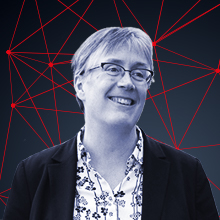
“Robots are stupid, but people need coffee”
Earlier this afternoon, a brief coffee break provided the audiences at CERN with a chance to mull over the ideas presented by the first session of talks. In the Auditorium and online, the second session of talks was preceded by a live Q&A between Tara Shears and Chris Lintott, looking into the roles of people, computers and robots in the future of science.
The talks continued to multiply dimensions, with themes from the first session cutting across several talks in the second. Citizen science, previously illustrated by Chris Lintott in the context of astronomy, featured prominently in George Church’s talk on DNA and genomics. Church alluded to the influence of Barbara McClintock’s pioneering research, which some have argued was not taken seriously because of her being a woman. Bias against women in science, and progress being made to address it, was the topic of Londa Schiebinger’s talk.
Another theme turning up throughout the day is how to handle large amounts of data – CERN’s use of the Grid network of computers was illustrated in the world premiere of the TED-ED/CERN animated video on “Big Data”, which you can watch here. The Grid was also key to allowing Brittany Wenger, winner of the 2012 Google Science Fair, to conduct her research into neural networks.
“Reach for the stars!”
The choir from the international secondary school in neighbouring French town Ferney-Voltaire directed by Laurence Beronjan, and the international School of Geneva Chorus directed by Andrew Close, gave a special “Mars edition” performance of Will.I.Am’s hit “Reach for the Stars”. The singer himself even made a surprise appearance via weblink, sharing his views on the future of education in science, technology, education and mathematic s (STEM).
Coming up next
In Session Three, we will explore the nature of consiousness, learn about how international collaboration in science may offer hope for the Middle East, find out that you’re never too young to be a research scientist (younger even than Brittany Wenger!). And what series of talks CERN would be complete without at least some mention of the Higgs boson?!
Don’t forget, you can follow all the action online. There’s the streaming webcast for the talks, plus up-to the-minute commentary, pictures and impressions on Twitter (follow @TEDxCERN and tweet using the hashtag #TEDxCERN) and Facebook.
Then catch up again right here at 20:00 (Swiss time) for our final post of the day.
TED-ED/CERN animated lessons:
- The beginning of the universe, for beginners
- Exploration on the Big Data frontier
- Dark matter: The matter we can't see
And here’s an exclusive bonus for our blog readers, a sneak peak at the videos to be shown in Session Three:
